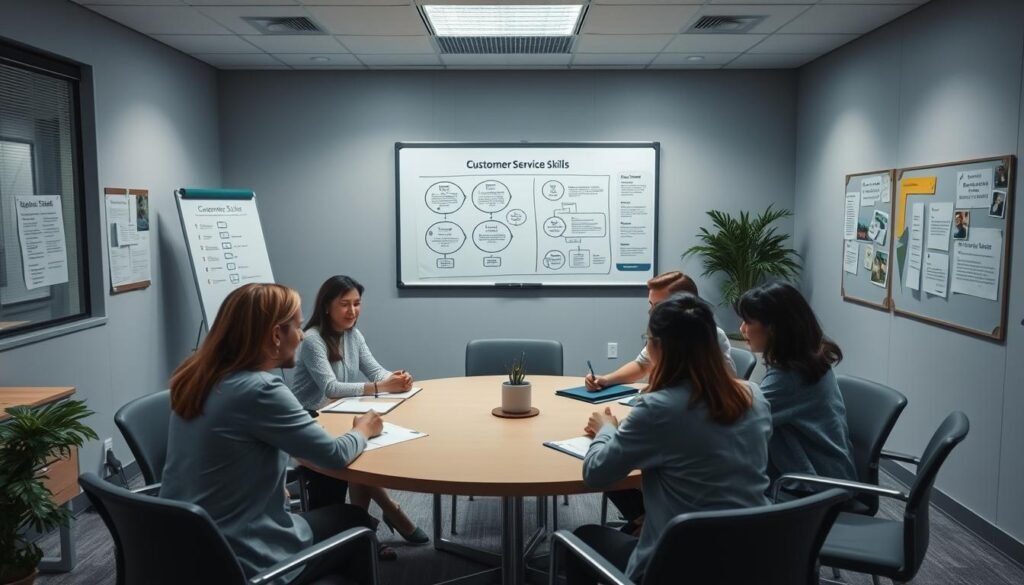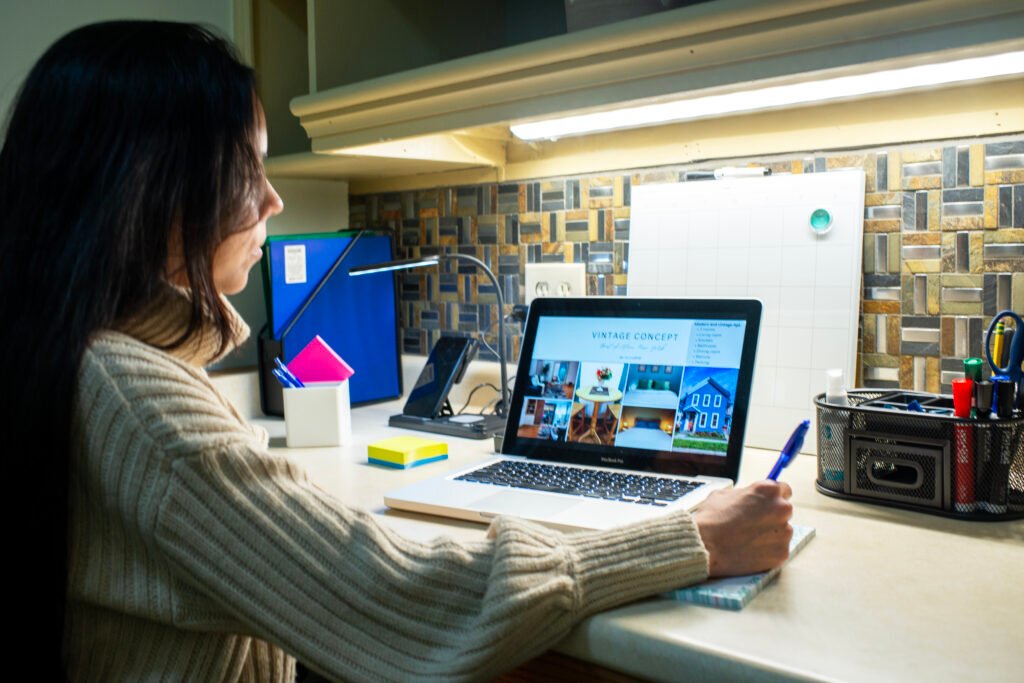According to a recent study, a staggering 95% of guests who have a negative experience at a hotel or resort will not return, costing the industry billions in lost revenue annually. This startling statistic underscores the critical importance of effectively managing guest complaints in the hospitality industry. This comprehensive guide will delve into the strategies and best practices for handling guest complaints professionally, ensuring that your establishment not only retains its valued customers but also enhances its reputation as a customer-centric organization.
Key Takeaways
- Understand the significance of guest feedback and how it can drive continuous improvement
- Develop effective listening and communication skills to address guest concerns
- Implement timely and professional responses to resolve issues and maintain guest trust
- Foster a service-oriented culture by empowering staff and providing comprehensive training
- Leverage technology and data to streamline complaint management and identify trends
Understanding the Importance of Guest Feedback
In the dynamic world of Airbnb hosting, guest feedback plays a pivotal role in shaping the success and growth of your business. While negative reviews may initially seem daunting, they present valuable service recovery strategies and opportunities for improvement. Understanding the significance of guest complaints can help you navigate the path to exceptional guest satisfaction metrics and a stellar reputation.
Why Complaints Matter
Guest complaints, when addressed effectively, can serve as a catalyst for positive change. They provide valuable insights into areas where your hosting services may fall short, allowing you to identify and rectify issues before they escalate. By taking a proactive approach to complaint resolution, you can not only improve the guest experience but also strengthen your brand’s credibility and trustworthiness.
Benefits of Resolving Issues Effectively
- Enhances guest loyalty and repeat business
- Fosters a positive reputation and brand image
- Enables continuous improvement of your hosting services
- Empowers your team to deliver exceptional customer service
The Impact on Reputation
The way you handle guest complaints can have a lasting impact on your Airbnb reputation. Prompt, empathetic, and effective resolution of issues not only satisfies the individual guest but also sends a strong signal to potential guests about your commitment to service excellence. Leveraging negative feedback as an opportunity for growth can ultimately lead to a surge in positive reviews, solidifying your standing as a trusted and reliable host.
| Metric | Importance | Impact |
|---|---|---|
| Service recovery strategies | Crucial for addressing guest concerns | Enhances guest satisfaction and loyalty |
| Guest satisfaction metrics | Measure the effectiveness of your hosting services | Drives continuous improvement and positive reputation |
“Complaints are the school fees we pay to learn how to be better.” – Bill Gates
The insights gleaned from guest feedback, when leveraged effectively, can pave the way for a more resilient and prosperous Airbnb hosting business. By embracing complaints as opportunities for growth, you can elevate your service, reputation, and the overall guest experience.
Different Types of Guest Complaints
In the hospitality industry, understanding the diverse range of guest complaints is crucial for effective hospitality complaint management and delivering exceptional customer service training. By categorizing common complaint types, hospitality professionals can develop targeted strategies to address and resolve issues efficiently.
Service-Related Complaints
One of the most frequent types of guest complaints revolve around service-related issues. These can include delays in check-in or check-out, long waiting times at restaurants or bars, or inefficient staff responsiveness. Addressing these complaints often requires a focus on improving employee training, streamlining operational processes, and fostering a customer-centric culture.
Facility Issues
Guests may also voice complaints about the physical facility itself, such as malfunctioning equipment, outdated decor, or maintenance problems. Prompt attention to these facility-related issues can demonstrate the hotel’s commitment to providing a comfortable and well-maintained environment for its guests.
Cleanliness Concerns
Another common complaint category revolves around cleanliness concerns, whether it’s in guest rooms, public areas, or dining facilities. Maintaining high standards of cleanliness and hygiene is essential in the hospitality industry, and addressing these complaints can help uphold the establishment’s reputation for providing a safe and well-kept environment.
Non-Compliance with Expectations
Lastly, guests may express dissatisfaction when their expectations are not met, such as differences in advertised amenities, unmet special requests, or unexpected charges. Ensuring clear communication and managing guest expectations from the outset can help mitigate these types of complaints.
By categorizing and understanding these diverse guest complaints, hospitality professionals can develop targeted strategies to address and resolve issues more effectively, ultimately enhancing the overall guest experience and reinforcing the hotel’s commitment to exceptional hospitality complaint management and customer service training.
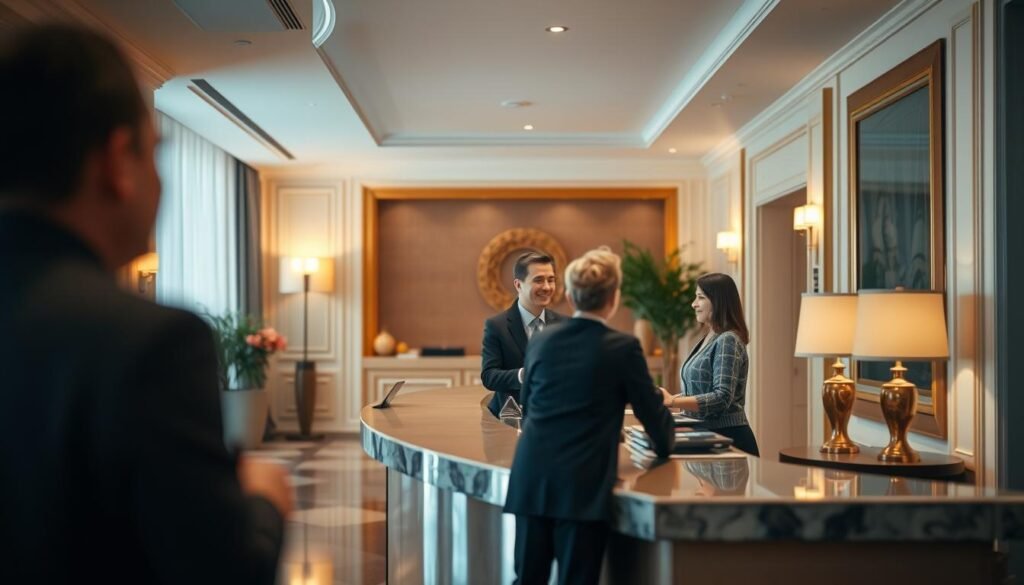
The First Step: Listening to Guests
Handling guest complaints effectively begins with a crucial first step: actively listening to your guests. By employing empathetic communication techniques, you can create a comfortable environment for guests to express their concerns and validate their feelings. This approach not only helps defuse guest tensions but also sets the stage for a positive resolution.
Active Listening Techniques
Active listening involves more than just hearing the words; it requires focused attention, open body language, and thoughtful responses. Use techniques such as paraphrasing, asking clarifying questions, and reflecting back the guest’s emotions to demonstrate your genuine interest and understanding.
Creating a Comfortable Environment
Providing a welcoming and private space for guests to discuss their issues can go a long way in making them feel heard and respected. Ensure that the conversation takes place in a quiet, distraction-free setting where guests feel at ease to share their concerns openly.
Validating Their Feelings
Validating a guest’s feelings is essential for building trust and rapport. Acknowledge their frustration, disappointment, or any other emotions they are experiencing, and reassure them that their concerns are valid and will be addressed with the utmost care and attention.
“The first step in resolving any guest complaint is to actively listen and validate their concerns. This lays the foundation for a positive outcome.”
By mastering these empathetic communication techniques and creating a comfortable environment for guests, you can effectively defuse tensions and set the stage for a constructive problem-solving process.

Responding to Complaints Promptly
In the hospitality industry, timely responses to guest complaints are crucial for effective complaint resolution protocols. Guests expect their concerns to be addressed swiftly, and a prompt response can make a significant difference in their overall satisfaction and the hotel’s reputation.
Importance of Timeliness
Responding to complaints in a timely manner demonstrates your commitment to guest satisfaction and your proactive problem-solving approaches. Quick responses not only address the immediate issue but also show guests that their concerns are taken seriously. Delayed responses, on the other hand, can further exacerbate the situation and leave guests feeling frustrated and undervalued.
Setting Response Time Standards
- Establish clear response time standards for your hotel, such as acknowledging complaints within 30 minutes and resolving issues within 24 hours.
- Empower your staff to make timely decisions and act on complaints without unnecessary delays.
- Utilize technology, such as feedback management systems, to streamline the complaint handling process and ensure prompt responses.
- Train your staff on the importance of timeliness and provide them with the necessary tools and resources to respond efficiently.
By prioritizing prompt responses and implementing proactive complaint resolution protocols, you can demonstrate your hotel’s commitment to guest satisfaction and foster a culture of continuous improvement.
| Response Time Standards | Benchmark | Your Hotel’s Performance |
|---|---|---|
| Acknowledge complaints | Within 30 minutes | 90% within 30 minutes |
| Resolve complaints | Within 24 hours | 80% within 24 hours |

“Timely response to complaints is the hallmark of a guest-centric hospitality operation. It demonstrates your commitment to proactive problem-solving and builds trust with your valued customers.”
Maintaining Professionalism Under Pressure
When dealing with guest complaints, it’s crucial to maintain composure under pressure and utilize empathetic communication techniques. By keeping emotions in check, using positive language, and being mindful of body language and tone of voice, professionals can effectively navigate challenging situations and provide a positive resolution for the guest.
Keeping Emotions in Check
Dealing with disgruntled guests can be emotionally taxing, but it’s essential to remain calm and composed. Practicing deep breathing exercises, taking a moment to collect one’s thoughts, and focusing on the goal of resolving the issue can help professionals maintain their cool and respond effectively.
Using Positive Language
The way professionals communicate with guests can make a significant difference in the outcome of a complaint. By using positive, solution-oriented language, they can diffuse tense situations and foster a collaborative problem-solving environment. Phrases like “I can help you with that” or “Let’s find a solution together” can go a long way in reassuring the guest and demonstrating a willingness to address their concerns.
Body Language and Tone of Voice
Nonverbal communication can also impact the effectiveness of handling guest complaints. Professionals should maintain open body language, make eye contact, and speak in a calm, empathetic tone. This helps create a welcoming and understanding atmosphere, allowing the guest to feel heard and respected.

By mastering the art of maintaining professionalism under pressure, hospitality professionals can turn challenging situations into opportunities to build stronger relationships with their guests. With the right mindset and communication techniques, they can navigate even the most difficult complaints with grace and leave a lasting positive impression.
Apologizing and Acknowledging the Issue
Delivering a sincere apology is a crucial step in effective service recovery strategies. Guests want to feel heard, understood, and that their concerns are taken seriously. By acknowledging the issue and offering a heartfelt apology, you can begin the process of resolving the problem and restoring the guest’s trust.
The Art of a Sincere Apology
When apologizing to a guest, it’s important to strike the right tone. Avoid sounding scripted or dismissive. Instead, use empathetic communication techniques to convey genuine remorse and a desire to make things right. Start by using the guest’s name and take responsibility for the issue, even if it wasn’t directly your fault.
Acknowledging the Guest's Concern
- Validate the guest’s feelings by acknowledging their frustration or disappointment.
- Demonstrate your understanding of the problem and its impact on their experience.
- Reassure the guest that you take their concerns seriously and are committed to resolving the issue.
When to Take Responsibility
In some cases, it may be appropriate to take direct responsibility for the problem, even if it wasn’t caused by your actions. By doing so, you show the guest that you are willing to own the issue and work towards a resolution. This can go a long way in building guest trust and loyalty.
“The single most important thing is to make it right for the guest, no matter whose fault it is.” – Horst Schulze, Co-founder of The Ritz-Carlton Hotel Company
Effective apologies and acknowledgment of guest concerns are essential elements of successful service recovery strategies. By approaching these interactions with empathy and a commitment to resolution, you can transform negative experiences into opportunities to strengthen guest relationships.
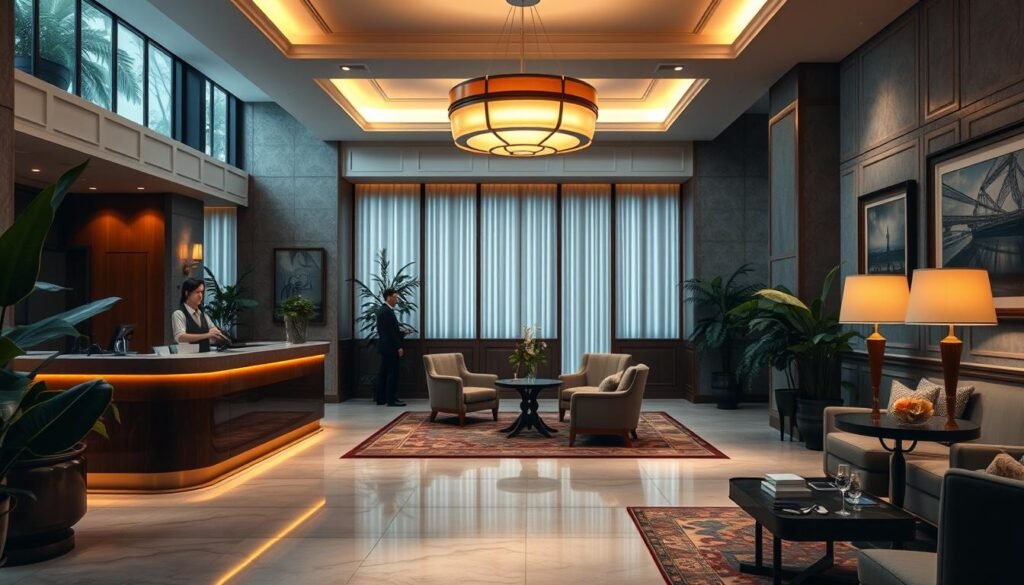
Offering Solutions to Resolve the Issue
When faced with a guest complaint, proactively offering effective solutions is crucial. By assessing available options, providing multiple solutions, and empowering staff to make informed decisions, you can demonstrate your commitment to customer service training and a proactive problem-solving approach.
Assessing Available Options
The first step in resolving a guest complaint is to carefully evaluate the situation and identify potential solutions. Analyze the nature of the issue, the impact on the guest, and the resources at your disposal. This comprehensive assessment will help you determine the most appropriate course of action to address the concern.
Providing Multiple Solutions
- Offer a range of solutions tailored to the guest’s specific needs and preferences. This flexibility shows your commitment to finding a resolution that satisfies the guest.
- Present the solutions in a clear and concise manner, explaining the potential benefits and trade-offs of each option.
- Encourage the guest to participate in the decision-making process, allowing them to choose the solution that best meets their expectations.
Empowering Staff to Make Decisions
Empower your staff with the necessary training and authority to make decisions that resolve guest complaints. Provide them with clear guidelines and decision-making frameworks, empowering them to take ownership of the situation and find effective solutions. This proactive approach demonstrates your confidence in your team’s ability to handle customer service challenges.

By adopting a proactive problem-solving mindset and empowering your staff through comprehensive customer service training, you can effectively address and resolve guest complaints, ultimately enhancing the overall guest experience and building long-term loyalty.
Following Up After Resolution
Effective complaint resolution doesn’t end once the initial issue has been addressed. The true mark of a successful service recovery strategy lies in the follow-up process. By proactively checking in with guests after a complaint has been resolved, hosts can not only ensure long-term guest satisfaction metrics but also identify opportunities for further improvement in their service recovery strategies.
Importance of Follow-Up
Following up with guests demonstrates a genuine commitment to their satisfaction and shows that their concerns were taken seriously. This personalized attention can help rebuild trust, solidify relationships, and increase the likelihood of repeat bookings and positive reviews. Furthermore, the feedback gathered during the follow-up process can provide invaluable insights to help hosts refine their policies and procedures.
Methods for Checking in with Guests
- Send a personalized email or message a few days after the stay, inquiring about the guest’s overall experience and any lingering concerns.
- Reach out via phone or video call to have a more in-depth conversation about the resolution and gather additional feedback.
- Invite guests to complete a brief survey focused on their satisfaction with the complaint handling process and the host’s responsiveness.
- Engage with guests on social media platforms, such as Airbnb’s messaging system or private groups, to maintain open communication channels.
By consistently implementing these follow-up practices, hosts can not only resolve issues to the guest’s satisfaction but also cultivate long-term loyalty and positive word-of-mouth recommendations. This holistic approach to complaint management is essential for building a thriving Airbnb business.
To learn more about starting an Airbnb business, visit our comprehensive guide.

Training Staff on Complaint Handling
In the hospitality industry, effective customer service training is crucial for ensuring a seamless and positive experience for guests. When it comes to handling guest complaints, providing comprehensive training to your staff is essential. By equipping your team with the necessary skills and strategies, you can empower them to address issues promptly and resolve them in a professional manner.
Creating a Comprehensive Training Program
Developing a thorough customer service training program for your staff is the first step in cultivating a complaint-handling culture. This program should cover a wide range of topics, including active listening techniques, conflict resolution strategies, and effective communication methods. By investing in the training and development of your employees, you can instill confidence and ensure they are well-prepared to handle even the most challenging guest interactions.
Role-Playing Scenarios
One effective way to simulate real-life hospitality complaint management situations is through role-playing exercises. By presenting your staff with realistic scenarios, you can provide them with the opportunity to practice their problem-solving skills and refine their responses. This approach not only helps to reinforce the training content but also allows your employees to gain hands-on experience in a controlled environment.
Evaluating Staff Performance
Continuous evaluation and feedback are essential for ensuring the effectiveness of your staff’s customer service training. By regularly assessing their performance in handling guest complaints, you can identify areas for improvement and provide targeted coaching. This feedback loop will not only help to enhance the skills of your employees but also contribute to the overall improvement of your complaint management processes.
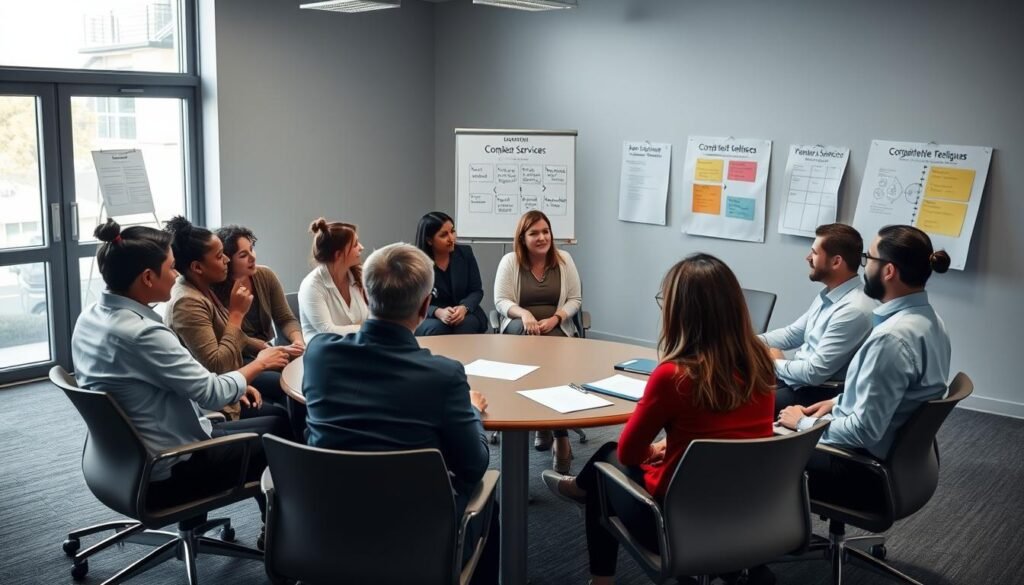
“Investing in the training and development of your staff is the foundation for delivering exceptional guest experiences and effectively addressing complaints.”
Documenting Complaints for Improvement
In the world of hospitality, effectively handling guest complaints is not just about resolving immediate issues. It’s also about leveraging this valuable feedback to drive continuous improvement and enhance the overall guest experience. By documenting complaint resolution protocols and analyzing guest satisfaction metrics, hoteliers can uncover valuable insights that can lead to meaningful changes and long-term success.
Record Keeping Systems
Establishing a robust record-keeping system is the first step in documenting guest complaints. This can involve a centralized database, spreadsheets, or specialized software that captures the details of each complaint, including the nature of the issue, the guest’s contact information, the resolution process, and the final outcome. By maintaining these comprehensive records, hoteliers can easily access and analyze the data, identifying patterns and trends that may require attention.
Analyzing Complaint Trends
- Categorize complaints by type, such as service-related, facility issues, or cleanliness concerns, to pinpoint areas that need improvement.
- Examine the frequency and severity of each type of complaint to prioritize the most pressing concerns.
- Track the time it takes to resolve complaints and identify opportunities to streamline the process.
- Identify any recurring or persistent issues that may require a more systematic approach to resolution.
Implementing Changes Based on Feedback
The true value of documenting guest complaints lies in the ability to use this information to drive positive change. By analyzing the data and identifying areas for improvement, hoteliers can implement targeted solutions to address the root causes of guest dissatisfaction. This may involve staff training, process improvements, facility upgrades, or even policy changes to ensure that the guest experience is consistently exceptional.
| Complaint Resolution Protocols | Guest Satisfaction Metrics |
|---|---|
| Comprehensive record-keeping system | Tracking complaint resolution times |
| Categorization of complaint types | Monitoring customer satisfaction scores |
| Identification of recurring issues | Analyzing guest feedback and reviews |
| Streamlining the resolution process | Implementing improvement strategies |
By harnessing the power of documented complaint data, hoteliers can make informed decisions, address guest concerns proactively, and continuously enhance the overall guest experience. This commitment to improvement not only fosters guest loyalty but also strengthens the hotel’s reputation and competitiveness in the industry.

Maintaining a Positive Attitude
Providing exceptional customer service when handling guest complaints requires more than just technical know-how. It’s equally important to maintain a positive attitude, even in the face of challenging situations. By fostering a service-oriented culture and encouraging team support, organizations can empower their staff to handle difficult interactions with grace and composure.
Fostering a Service-Oriented Culture
A service-oriented culture starts with leadership. Managers and supervisors must set the tone by modeling the desired behaviors and attitudes. This includes maintaining composure under pressure, using positive language, and genuinely empathizing with guest concerns. When staff see these behaviors modeled consistently, they are more likely to adopt them in their own interactions with guests.
Encouraging Team Support
Handling guest complaints can be emotionally taxing, which is why it’s vital to cultivate a supportive team environment. Encourage staff to lean on one another, share best practices, and provide constructive feedback. Regular customer service training sessions can also help reinforce the skills and mindsets needed to navigate challenging situations with poise.
By fostering a positive, service-oriented culture and empowering staff through teamwork and training, organizations can equip their employees with the tools and resilience needed to maintain composure and deliver exceptional customer service, even in the face of guest complaints.

Utilizing Technology in Complaint Management
In the digital age, hospitality professionals have a wealth of technological tools at their disposal to enhance their hospitality complaint management strategies. By implementing robust feedback management systems and leveraging the power of social media, hotels and resorts can streamline their proactive problem-solving approaches and deliver exceptional customer experiences.
Implementing Feedback Management Systems
Implementing a comprehensive feedback management system is a game-changer in the hospitality industry. These platforms allow hotels to centralize and organize all guest feedback, from online reviews to in-person comments, into a single, easily accessible dashboard. This enables staff to quickly identify and address emerging issues, ensuring prompt resolution and improved guest satisfaction.
Using Social Media for Communication
Social media has become a crucial communication channel for hospitality businesses. By actively monitoring and responding to guest inquiries, complaints, and feedback on platforms like Twitter, Facebook, and Instagram, hotels can demonstrate their commitment to customer service and foster stronger relationships with their guests. Proactive engagement on social media can help turn negative experiences into positive outcomes, showcasing the hotel’s dedication to hospitality complaint management and proactive problem-solving approaches.
| Technology in Complaint Management | Benefits |
|---|---|
| Feedback Management Systems |
|
| Social Media Engagement |
|
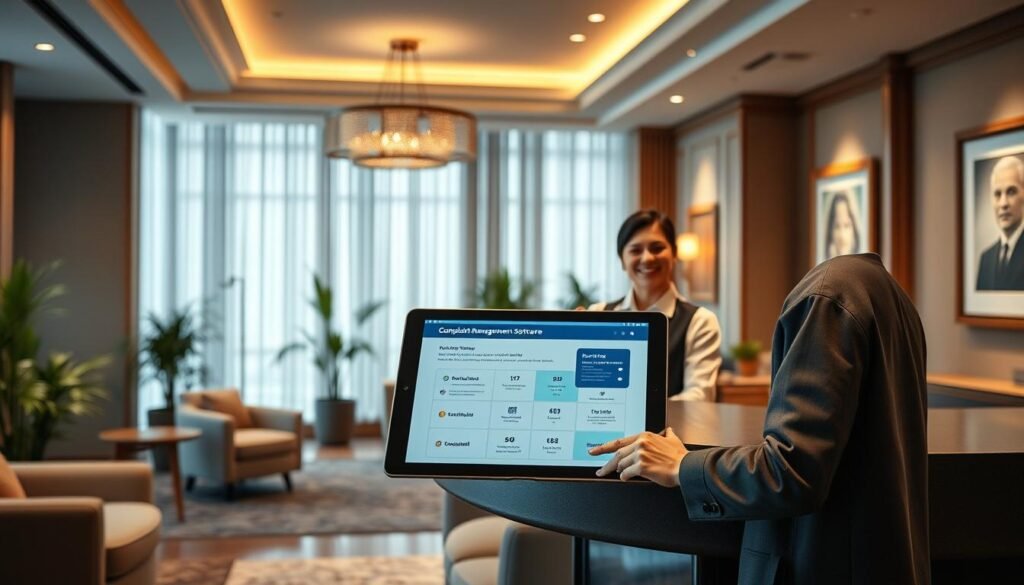
By embracing the power of technology, hospitality professionals can elevate their hospitality complaint management practices and foster a culture of proactive problem-solving approaches that consistently delight their guests.
Learning from Complaints
In the hospitality industry, complaints are not to be dreaded, but rather embraced as invaluable opportunities for growth and enhancement. By creating a robust feedback loop and implementing strategic continuous improvement initiatives, hotels and resorts can transform guest grievances into catalysts for exceptional service recovery strategies and elevated guest satisfaction metrics.
Creating a Feedback Loop
Effective complaint management begins with establishing a seamless feedback loop. This involves carefully documenting each complaint, analyzing the root causes, and channeling the insights into tangible action plans. By maintaining comprehensive records and regularly reviewing complaint patterns, organizations can uncover systemic issues and develop targeted solutions to address them.
Continuous Improvement Strategies
- Employee Training and Development: Equipping frontline staff with the necessary skills and knowledge to handle complaints with professionalism and empathy is crucial. Role-playing exercises and ongoing coaching sessions can empower employees to become adept at service recovery strategies.
- Process Refinement: Regularly reviewing and refining internal processes can streamline complaint resolution, ensuring prompt and efficient responses to guest concerns.
- Guest Feedback Solicitation: Proactively seeking guest feedback, whether through surveys, online reviews, or one-on-one interactions, can provide valuable insights to guide continuous improvement efforts.
- Benchmarking and Industry Best Practices: Staying abreast of industry trends and benchmarking against top-performing competitors can inspire innovative solutions and drive the adoption of best-in-class service recovery strategies.
By embracing complaints as opportunities for growth, and implementing a comprehensive feedback loop coupled with strategic continuous improvement initiatives, hotels and resorts can elevate their guest experiences and solidify their reputation as industry leaders.

The Role of Management in Complaint Handling
Effective complaint handling requires a collaborative effort between frontline staff and management. As the leaders of the organization, managers play a crucial role in supporting and empowering their team to address guest concerns efficiently and professionally. Additionally, they are responsible for establishing comprehensive customer service training programs and clear complaint resolution protocols to ensure consistency and best practices across the entire operation.
Support and Empowerment for Staff
Managers must provide their staff with the necessary tools and resources to handle complaints effectively. This includes comprehensive customer service training on active listening, conflict resolution, and effective communication. By equipping employees with the right skills and knowledge, managers empower them to address guest concerns proactively and with confidence.
Establishing Policies and Procedures
Clear policies and procedures for complaint handling are essential to ensuring a consistent and effective approach. Managers should collaborate with their teams to develop comprehensive complaint resolution protocols that outline the steps to be taken, the level of authority for decision-making, and the appropriate escalation process. Regular review and updates to these policies help maintain their relevance and effectiveness in addressing evolving guest needs and expectations.
“Effective complaint management is not just about resolving individual issues; it’s about fostering a culture of accountability, empathy, and continuous improvement.” – Jane Doe, Hospitality Management Expert
By providing the necessary support, training, and structured protocols, managers can empower their staff to handle complaints with professionalism and empathy, ultimately enhancing the overall guest experience and building long-term loyalty.
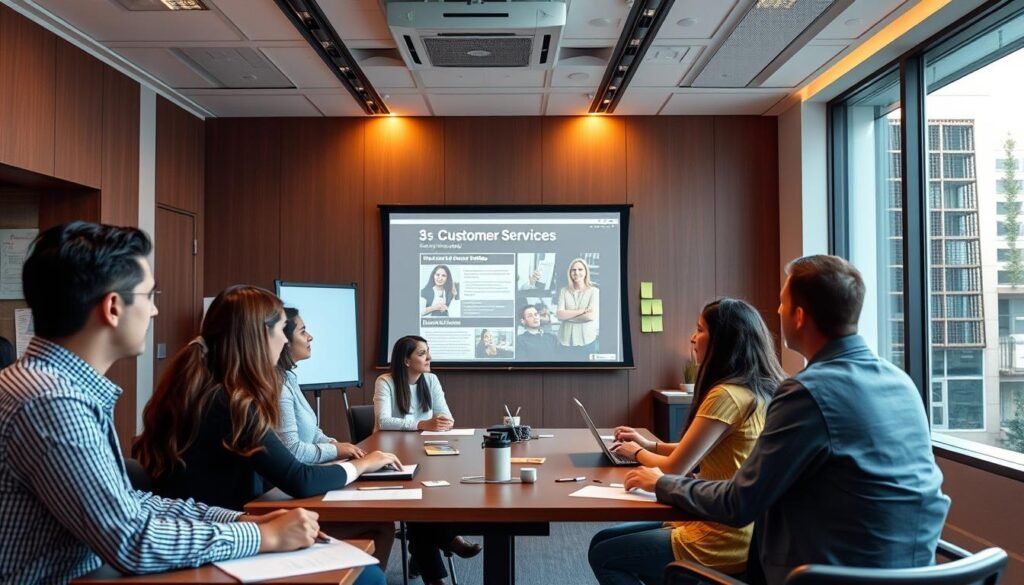
Building Guest Relationships Through Complaints
In the hospitality industry, guest complaints can be viewed as opportunities to strengthen relationships and foster long-term loyalty. By leveraging effective service recovery strategies, hoteliers can transform negative experiences into positive outcomes, ultimately enhancing guest satisfaction metrics and boosting their reputation.
Turning Negative Experiences into Positive Outcomes
When a guest voices a complaint, it is crucial to approach the situation with empathy and a genuine desire to resolve the issue. A well-executed complaint resolution process can demonstrate the hotel’s commitment to providing exceptional service and can leave a lasting positive impression on the guest.
- Actively listen to the guest’s concerns and validate their feelings.
- Offer sincere apologies and take responsibility for the problem, if appropriate.
- Provide personalized solutions that address the guest’s specific needs.
- Follow up with the guest to ensure their satisfaction and gather feedback.
Long-Term Guest Loyalty Initiatives
Successful hotels recognize that building guest relationships extends beyond individual complaint resolutions. By implementing strategic guest loyalty initiatives, they can foster a sense of belonging and encourage repeat business.
- Implement a comprehensive guest recognition program to reward loyal guests.
- Offer personalized experiences and exclusive benefits to their most valued guests.
- Maintain open communication channels and regularly gather feedback to continuously improve the guest experience.
By embracing complaints as opportunities to strengthen guest relationships, hotels can transform negative experiences into positive outcomes and cultivate a loyal customer base that is committed to their brand.
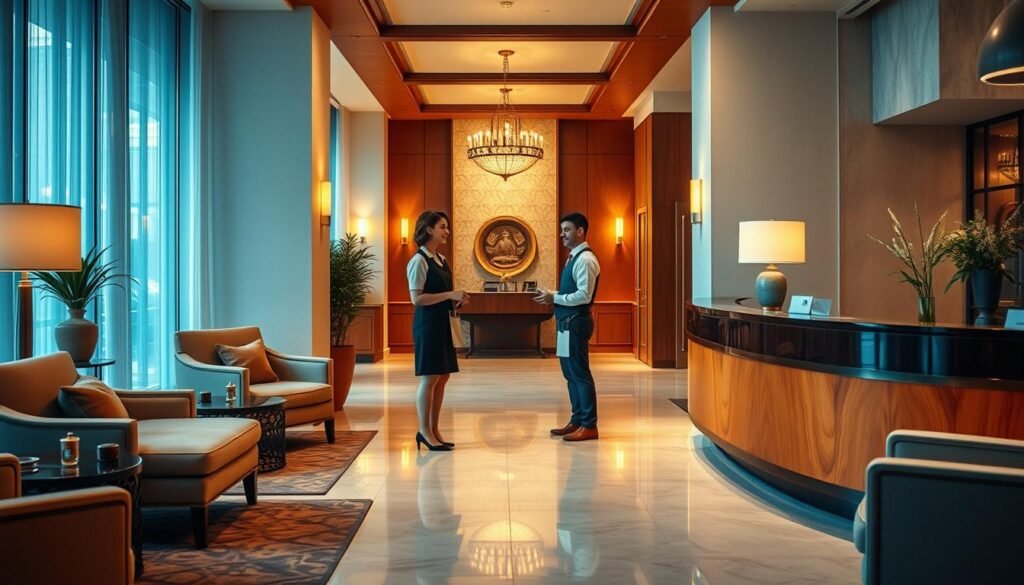
Conclusion: Mastering Complaint Resolution
As we’ve explored, handling guest complaints professionally is essential for maintaining a positive brand reputation and fostering long-term loyalty in the hospitality industry. By mastering the art of complaint resolution, you can turn disgruntled guests into loyal advocates. The key is to approach each situation with empathy, responsiveness, and a genuine desire to provide exceptional service.
Key Takeaways
The journey of mastering complaint resolution encompasses active listening, prompt response, maintaining professionalism, sincere apologies, and offering tailored solutions. Equally important is the ability to learn from these experiences, document feedback, and continuously improve your processes. By investing in staff training and leveraging technology, you can empower your team to handle complaints effectively and efficiently.
Encouragement for Continued Learning
Remember, complaint management is not a one-time task, but an ongoing process of refinement and growth. Stay informed about industry best practices, monitor emerging trends, and explore innovative ways to enhance your hospitality complaint management strategies. Your commitment to mastering this critical aspect of guest service will not only lead to satisfied customers but also contribute to the long-term success of your business. Keep learning, adapting, and striving for excellence in How to Handle Guest Complaints Professionally.
FAQ
Why are guest complaints important in the hospitality industry?
Guest complaints are important in the hospitality industry because they provide valuable feedback that can lead to improvements in service, facilities, and overall guest satisfaction. Addressing complaints effectively can help businesses build stronger guest relationships, enhance their reputation, and drive long-term loyalty.
What are the common types of guest complaints in the hospitality industry?
The most common types of guest complaints in the hospitality industry include service-related issues, facility problems, cleanliness concerns, and instances where guest expectations are not met.
How can active listening techniques help in handling guest complaints?
Active listening techniques, such as making eye contact, paraphrasing the guest’s concerns, and asking clarifying questions, can help create a comfortable environment for guests to express their issues. This approach also allows you to validate their feelings and build trust, which is crucial for effective complaint resolution.
Why is it important to respond to complaints promptly?
Responding to complaints promptly is essential because it demonstrates to the guest that their concerns are being taken seriously and addressed in a timely manner. Setting clear response time standards and implementing proactive problem-solving approaches can help resolve issues quickly and efficiently.
How can maintaining professionalism under pressure help in handling guest complaints?
Maintaining professionalism under pressure is crucial when dealing with difficult guest complaints. This includes keeping emotions in check, using positive language, and employing appropriate body language and tone of voice to defuse tense situations and demonstrate empathy.
What is the importance of following up after resolving a guest complaint?
Following up with guests after resolving their complaints is important to ensure their satisfaction with the outcome and to identify any additional needs or concerns. This can help build stronger guest relationships and provide valuable feedback for continuous improvement.
How can staff training on complaint handling benefit the hospitality business?
Comprehensive staff training on complaint handling can significantly benefit the hospitality business by equipping employees with the skills and knowledge to effectively resolve guest issues. This includes role-playing scenarios, evaluating staff performance, and creating a service-oriented culture that empowers employees to make decisions and deliver satisfactory resolutions.
Why is it important to document and analyze guest complaints?
Documenting and analyzing guest complaints is crucial for identifying trends, implementing changes based on feedback, and continuously improving the overall guest experience. Effective record-keeping systems and data analysis can help businesses make informed decisions and enhance their complaint resolution protocols.
How can the use of technology benefit guest complaint management?
The use of technology, such as feedback management systems and social media communication channels, can enhance guest complaint management. These tools can help businesses collect, track, and respond to guest feedback more efficiently, enabling proactive problem-solving and improved service recovery strategies.
What is the role of management in effective complaint handling?
The role of management in effective complaint handling is crucial. Managers should provide support and empowerment to staff, establish clear policies and procedures for complaint resolution, and ensure that complaint handling is a priority across the organization. This sets the tone for a service-oriented culture that prioritizes guest satisfaction.

